Insulin: A Primer
Insulin is a hormone that regulates the levels of sugar in your blood. When you eat a meal, the carbohydrate in the meal is broken down into glucose (a sugar used as energy by your cells). The glucose enters your blood. Your pancreas senses the rising glucose and releases insulin. Insulin allows the glucose to enter your liver, muscle, and fat cells. Once your blood glucose starts to come back down, insulin levels come back down too. This cycle happens throughout the day. You eat a meal, glucose goes up, insulin goes up, glucose goes down, and insulin goes down. Insulin levels are typically lowest in the early morning since it's usually been at least 8 hours after your last meal.
Insulin doesn't just regulate blood sugar. It has other effects as well. For example, it stimulates your muscles to build new protein (a process called protein synthesis). It also inhibits lipolysis (the breakdown of fat) and stimulates lipogenesis (the creation of fat).
It is the latter effect by which insulin has gotten its bad reputation. Because carbohydrate stimulates your body to release insulin, it has caused some people to argue that a diet high in carbohydrate will cause you to gain fat. Their reasoning, in a nutshell, goes like this:
High Carbohydrate Diet -> High Insulin -> Increased Lipogenesis/Decreased Lipolysis -> Increased Body Fat -> Obesity
Using this same logic, they argue that a low carbohydrate diet is best for fat loss, because insulin levels are kept low. Their logic chain goes something like this:
Low Carbohydrate Diet -> Low Insulin -> Decreased Lipogenesis/Increased Lipolysis -> Decreased Body Fat
However, this logic is based on many myths. Let's look at many of the myths surrounding insulin.
MYTH:A High Carbohydrate Diet Leads to Chronically High Insulin Levels
FACT:Insulin Is Only Elevated During the Time After a Meal In Healthy Individuals
One misconception regarding a high carbohydrate intake is that it will lead to chronically high insulin levels, meaning you will gain fat because lipogenesis will constantly exceed lipolysis (remember that fat gain can only occur if the rate of lipogenesis exceeds the rate of lipolysis). However, in healthy people, insulin only goes up in response to meals. This means that lipogenesis will only exceed lipolysis during the hours after a meal (known as the postprandial period). During times when you are fasting (such as extended times between meals, or when you are asleep), lipolysis will exceed lipogenesis (meaning you are burning fat). Over a 24-hour period, it will all balance out (assuming your are not consuming more calories than you are expending), meaning you do not gain weight. Here's a graph showing how this works:
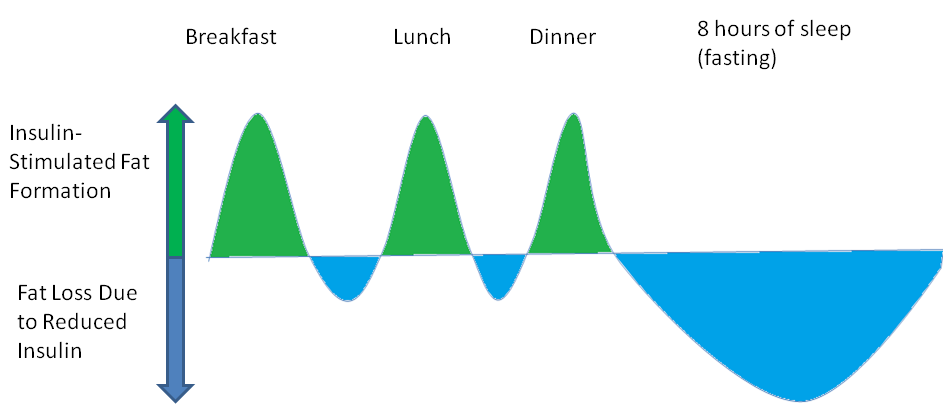
After meals, fat is deposited with the help of insulin. However, between meals and during sleep, fat is lost. Fat balance will be zero over a 24-hour period if energy intake matches energy expenditure.
This is just a rough chart that I made, but the green area represents the lipogenesis occuring in response to a meal. The blue area represents lipolysis occuring in response to fasting between meals and during sleep. Over a 24-hour period, these will be balanced assuming you are not consuming more calories than you expend. This is true even if carbohydrate intake is high. In fact, there are populations that consume high carbohydrate diets and do not have high obesity rates, such as the traditional diet of the Okinawans. Also, if energy intake is lower than energy expenditure, a high carbohydrate diet will result in weight loss just as any other diet.
MYTH: Carbohydrate Drives Insulin, Which Drives Fat Storage
FACT: Your Body Can Synthesize and Store Fat Even When Insulin Is Low
One of the biggest misconceptions regarding insulin is that it's needed for fat storage. It isn't. Your body has ways to store and retain fat even when insulin is low. For example, there is an enzyme in your fat cells called hormone-sensitive lipase (HSL). HSL helps break down fat. Insulin suppresses the activity of HSL, and thus suppresses the breakdown of fat. This has caused people to point fingers at carbohydrate for causing fat gain.
However, fat will also suppress HSL even when insulin levels are low. This means you will be unable to lose fat even when carbohydrate intake is low, if you are overeating on calories. If you ate no carbohydrate but 5,000 calories of fat, you would still be unable to lose fat even though insulin would not be elevated. This would be because the high fat intake would suppress HSL. This also means that, if you're on a low carbohydrate diet, you still need to eat less calories than you expend to lose weight.
Now, some people might say, "Just try and consume 5000 calories of olive oil and see how far you get." Well, 5000 calories of olive oil isn't very palatable so of course I won't get very far. I wouldn't get very far consuming 5,000 calories of pure table sugar either.
MYTH: Insulin Makes You Hungry
FACT: Insulin Suppresses Appetite
It is a well known fact that insulin acutely suppresses appetite. This has been demonstrated in dozens and dozens of experiments. This will be important when we talk about the next misconception...
MYTH: Carbohydrate Is Singularly Responsible for Driving Insulin
FACT: Protein Is a Potent Stimulator of Insulin Too
This is probably the biggest misconception that is out there. Carbohydrates get a bad rap because of their effect on insulin, but protein stimulates insulin secretion as well. In fact, it can be just as potent of a stimulus for insulin as carbohydrate. One recent study compared the effects of two different meals on insulin. One meal contained 21 grams of protein and 125 grams of carbohydrate. The other meal contained 75 grams of protein and 75 grams of carbohydrate. Both meals contained 675 calories. Here is a chart of the insulin response:
Now here's a chart of the blood sugar response:
You can see that, despite the fact that the blood sugar response was much higher in the meal with more carbohydrate, the insulin response wasn't higher. In fact, the insulin response was somewhat higher after the high protein meal, although this wasn't statistically significant.
Some people might argue that the "low-carb" condition wasn't really low carb because it had 75 grams of carbohydrate. But that's not the point. The point is that the high-carb condition had nearly TWICE as much carbohydrate, along with a HIGHER glucose response, yet insulin secretion was slightly LOWER. The protein was just as powerful at stimulating insulin as the carbohydrate.
I can also hear arguments coming like, "Yeah, but the insulin response is longer and more drawn out with protein." That wasn't true in this study either.
You can see in the chart that there was a trend for insulin to peak faster with the high protein condition, with a mean response of 45 uU/mL at 20 minutes after the meal, versus around 30 uU/mL in the high carb condition.
This tendency for a higher insulin response was associated with a tendency towards more appetite suppression. The subjects had a tendency towards less hunger and more fullness after the high protein meal:

Comparison of low protein, high carb and high protein, low carb meals and their effects on hunger and fullness
Here's the results of another study that compared the effects of 4 different types of protein on the insulin response to a meal. This study was interesting because they made milkshakes out of the different proteins (tuna shakes???? YUCK!!!!! Of course some people may remember the tuna shake recipes from the misc.fitness.weights days). The shakes contained only 11 grams of carbohydrate, and 51 grams of protein. Here's the insulin response to the different shakes:
You can see that all of these proteins produced an insulin response, despite the fact that the carbohydrate in the shake was low. There was also different insulin responses between the proteins, with whey producing the highest insulin response.
Now, some might argue that the response is due to gluconeogenesis (a process by which your liver converts protein to glucose). The thought is that the protein will be converted to glucose, which will then raise insulin levels. As I mentioned earlier, people will claim that this will result in a much slower, more drawn-out insulin response, since it takes time for your liver to turn protein into glucose. However, that's not the case, because the insulin response was rapid, peaking within 30 minutes and coming back down quickly at 60 minutes:
This rapid insulin response was not due to changes in blood glucose. In fact, whey protein, which caused the greatest insulin response, caused a drop in blood glucose:
The insulin response was associated with appetite suppression. In fact, the whey protein, which had the highest insulin response, caused the greatest suppression of appetite. Here's a chart showing the calorie intake of the subjects when they ate lunch 4 hours after drinking the shake:
The subjects ate nearly 150 calories less at lunch when they had whey protein, which also caused the greatest insulin response. In fact, there was an extremely strong inverse correlation between insulin and food intake (a correlation of -0.93).
Here's data from another study that looked at the insulin response to a meal that contained 485 calories, 102 grams of protein, 18 grams of carbohydrate, and almost no fat:
You can see that the insulin response was exaggerated in the obese subjects, probably due to insulin resistance. Here's a chart of the blood glucose response. You can see there was no relationship between the glucose response and insulin, which was similar to the study discussed earlier.
The fact is that protein is a potent stimulator of insulin secretion, and this insulin secretion is not related to changes in blood sugar or gluconeogenesis from the protein. In fact, one study found beef to stimulate just as much insulin secretion as brown rice. The blood sugar response of 38 different foods could only explain 23% of the variability in insulin secretion in this study. Thus, there's a lot more that's behind insulin secretion than just carbohydrate.
So how can protein cause rapid rises in insulin, as shown in the whey protein study earlier? Amino acids (the building blocks of protein) can directly stimulate your pancreas to produce insulin, without having to be converted to glucose first. For example, the amino acid leucine directly stimulates pancreas cells to produce insulin, and there's a direct dose-response relationship (i.e., the more leucine, the more insulin is produced).
Some might say, "Well, sure, protein causes insulin secretion, but this won't suppress fat-burning because it also causes glucagon secretion, which counteracts insulin's effects." I mentioned earlier how insulin will suppress lipolysis. Well, some people think that glucagon increases lipolysis to cancel this out.
The thought that glucagon increases lipolysis is based on 3 things: the fact that human fat tissue has glucagon receptors, the fact that glucagon increases lipolysis in animals, and the fact that glucagon has been shown to increase lipolysis in human fat cells in vitro (in a cell culture). However, what happens in vitro isn't necessarily what happens in vivo (in your body). We have a case here where newer data has overturned old thinking. Research using modern techniques has shown that glucagon does not increase lipolysis in humans. Other research using the same techniques has shown similar results. I will also note that this research failed to find any lipolytic effect in vitro.
It should be remembered why glucagon is released in response to protein in the first place. Since protein stimulates insulin secretion, it would cause a rapid drop in blood glucose if no carbohydrate is consumed with the protein. Glucagon prevents this rapid drop in blood sugar by stimulating the liver to produce glucose.
Insulin: Not Such a Villain After All
The fact is that insulin is not this terrible, fat-producing hormone that must be kept as low as possible. It is an important hormone for appetite and blood sugar regulation. In fact, if you truly wanted to keep insulin as low as possible, then you wouldn't eat a high protein diet...you would eat a low protein, low carbohydrate, high fat diet. However, I don't see anybody recommending that.
I'm sure some are having some cognitive dissonance reading this article right now. I know because I experienced the same disbelief years ago when I first discovered this paper and how protein caused large insulin responses. At the time, I had the same belief that others have...that insulin had to be kept under control and as low as possible, and that spikes in insulin were a bad thing. I had difficulty reconciling that study and my beliefs regarding insulin. However, as time went on, and as I read more research, I learned that my beliefs regarding insulin were simply wrong.
Now, you may be wondering why refined carbohydrates can be a problem. Many people think it's due to the rapid spikes in insulin. However, it's obviously not the insulin, because protein can cause rapid spikes in insulin as well. One problem with refined carbohydrate is a problem of energy density. With refined carbohydrate, it is easier to pack a lot of calories into a small package. Not only that, but foods with high energy density are often not as satiating as foods with low energy density. In fact, when it comes to high-carbohydrate foods, energy density is a strong predictor of a food's ability to create satiety (i.e., low-energy density foods create more satiety). There are other issues with refined carbohydrate as well that are beyond the scope of this article.
The bottom line is that insulin doesn't deserve the bad reputation it's been given. It's one of the main reasons why protein helps reduce hunger. You will get insulin spikes even on a low-carb, high-protein diet. Rather than worrying about insulin, you should worry about whatever diet works the best for you in regards to satiety and sustainability. As mentioned in a previous article, individual responses to particular diets are highly variable and what works for one person will not necessarily work for another. I will be writing a post in the future on the need for individualized approaches to nutrition.
Click here to read part 2 of this series on insulin.

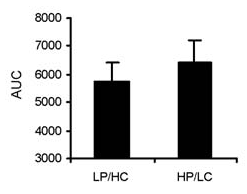
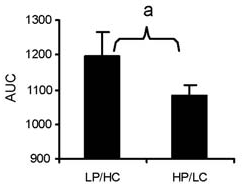

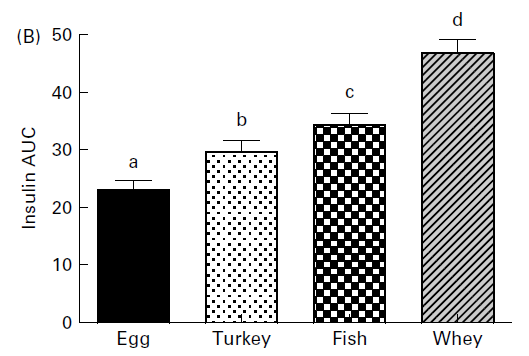
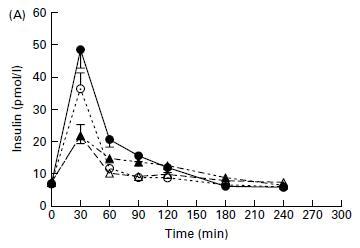
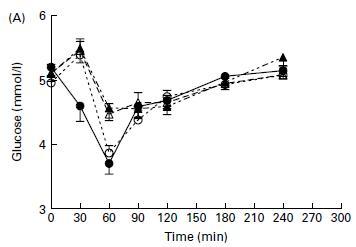
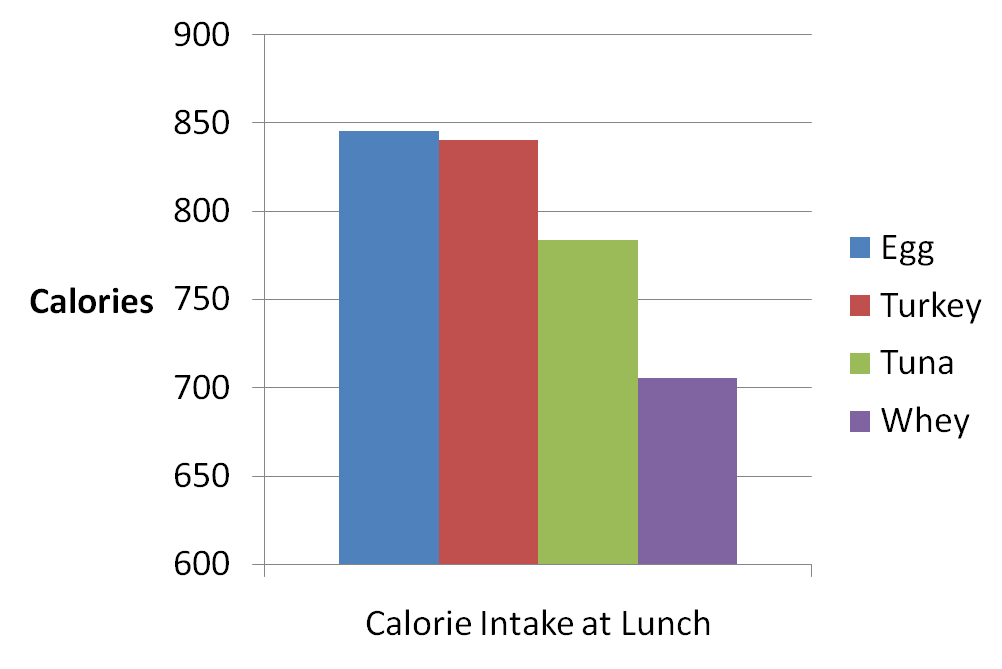
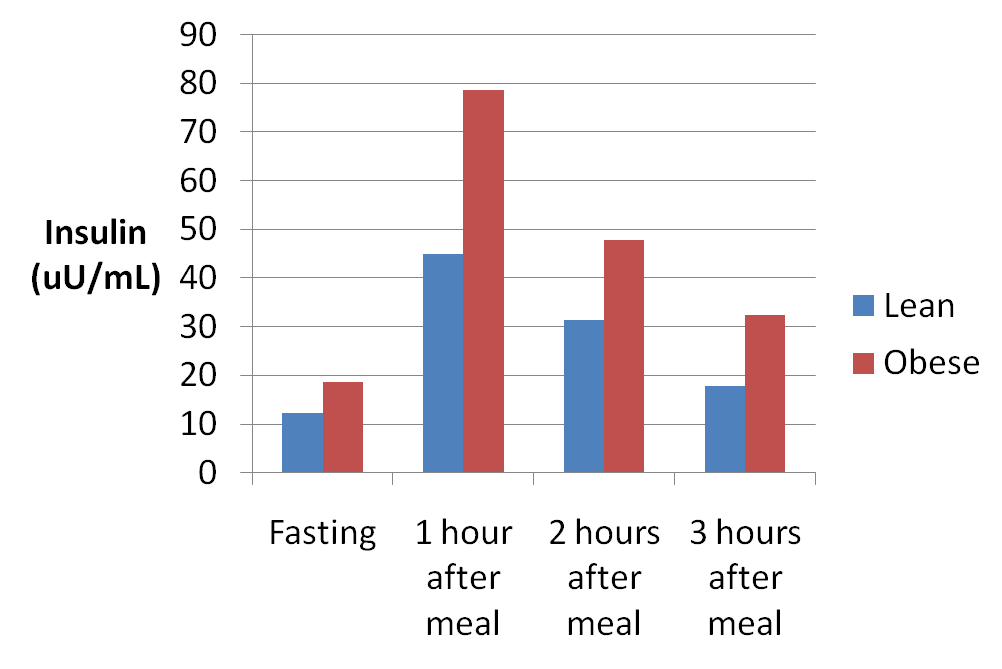
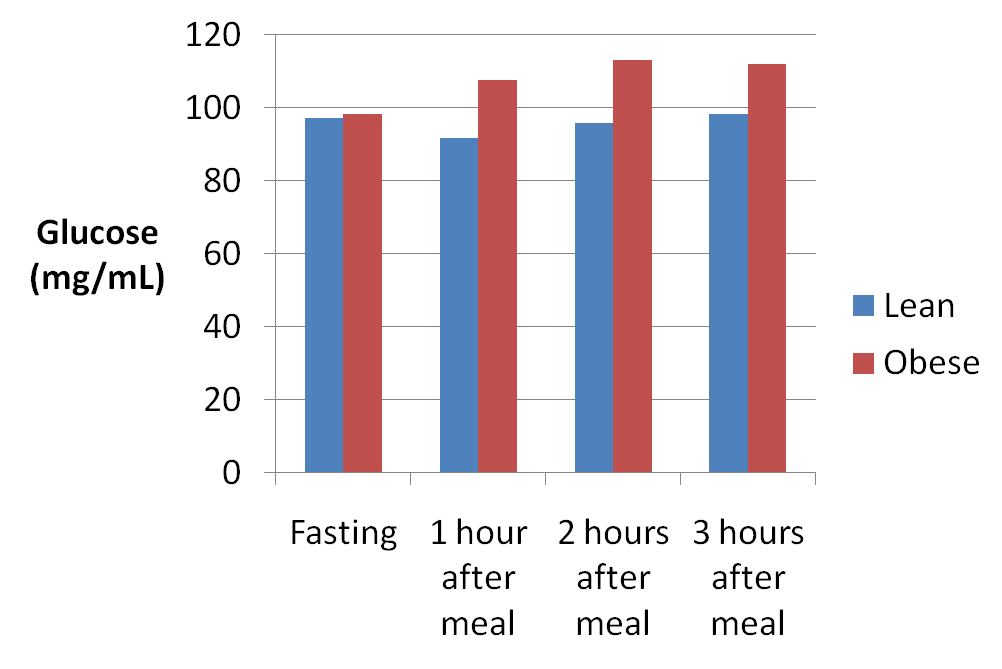
Good research, James. But I think that two of your conclusions are unwarranted, because they go beyond what your data shows. First, you have not proven that insulin suppresses hunger. You have only shown that foods which cause insulin to rise (protein and carbohydrate) also suppress hunger. Association does not imply causality. In fact, there are experiments reported by Taubes showing that injecting insulin without simultaneously supplying calories does cause a sudden increase in hunger. So a more plausible interpretation of the data you present here is that the foods (whey, tuna, etc.) are supplying hunger-suppressing peptides and sugars to… Read more »
Todd, thanks for your comment. First, you have not proven that insulin suppresses hunger. I referenced this review paper which summarizes insulin’s anorexigenic effects. It has been repeatedly demonstrated that insulin administration into the brain suppresses appetite. There are literally dozens and dozens of studies on this (such as this one). It has also been demonstrated that knocking out insulin receptors of a rodent’s brain causes it to overeat. So the relationship between insulin and appetite suppression is causational and not just correlational. In fact, there are experiments reported by Taubes showing that injecting insulin without simultaneously supplying calories does… Read more »
James, I’m still not convinced that insulin is not a primary driver of hunger. The brain infusion experiment you cited by Air et al injected very low doses of insulin directly into a brain ventricle “in doses that do not affect blood glucose”. First, this does not tell us what affect insulin would have if administered at the the higher levels typical of postprandial or even preprandial secretion. Perhaps insulin inhibits appetite at very low levels, in certain brain locations, but stimulates appetite at normal , higher levels. Biochemical regulation often exhibits such dose or location dependence, producing homeostatic feedback… Read more »
stomach produced ghrelin has been shown recently to entrain itself to regular food patterns – the ghrelin is produced significantly before the expected food intake
Seems a better candidate to produce hunger at regular feed times than insulin
damn …. so hard to get out of a univariate-causation thinking style
>>> Seems a better candidate to produce hunger at regular feed times than insulin
would be better said:
is a good candidate for being part of the chain (IMHO maybe an earlier part of the chain) that controls hunger, along with leptin & low blood glucose & insulin & brain reward mechanisms
I would agree that the majority of future research should be geared towards behavioarl aspects of nutrition. Brian Wansink (book- Mindless Eating) does a good job addressing environmental factors and their affect on food intake
jhale
The “Insulin causes obesity” myth is probably one of the most popular myths disseminated by the fitness industry. This is a common example of a limited understanding of insulin’s influence on a mutltitude of bodily functions. It also demonstrates the tendency for people to base beliefs on authority and lack of crticial thinking ability, rather than science. Why do so many people belief this unfounded claim? Because their friend read it and told them so , or “they say”, or maybe their favorite fitness author said so. When comparing diets- with equal calories- that result in hyperinsulinemia versus low-normal insulinemia… Read more »
Jamie, I just finished reading your book for a second time; good stuff my friend! Honestly, and speaking from the perspective of a “reformed fat bastard”, fat folks need a boogey-man to blame for their gluttony (which is an eating disorder no one wants to talk about …) and many are blissfully ignorant of the basics of fat loss. Even in this day of easily accessible information, I find many people still don’t really think that calories are that important. And, I’m not talking about LC fanaticos either. I believe that so much marketing has caused the “basics” to be… Read more »
Muata,
Hopefully Jamie will respond as well, but there is a lot of research that has looked at the various psychological, social, and cultural barriers that obese people face, which is why keeping weight off for the long term is so challenging no matter what type of diet someone uses. PubMed searches can help turn up a lot of information on this.
Darrin, I’ve bought plain, nothing added, full fat yogurt at a Wal Mart in a small Kentucky town.
Difficult to not follow a low fat diet today? Yeah, when one isn’t eating burgers, pizza, ice cream, cookies, french fries, and doughnuts! lol.
I love olive oil margarine. Tastes great and very spreadable. I also like using a margarine spray when I want a low-cal alternative.
“what we are doing isn’t working.” Yeah, what we’re doing is eating too much, period. That clearly isn’t working.
I live in the middle of San Diego and haven’t yet found full fat yogurt in my enormous Ralph’s. Consider yourself lucky! Yes. It is more difficult to eat high-fat than low-fat these days. As you might have guessed, I’m not big on the processed foods, but let’s look at the foods you listed from what I remember seeing at the grocery store: Burgers: I have to bend over backwards to get some good fatty burgers. (aka the only kind anyone ate up until the low fat fad started.) But I can find a mountain of 90% lean at the… Read more »
This is what happens when people are totally consumed and absorbed by their ideology: “Yes. It is more difficult to eat high-fat than low-fat these days.” Utterly ridiculous. Milkshakes, donuts, burgers, steaks, pizza, ice cream, cookies, candy bars, french fries, fried chicken, pies, cakes, cheesecake, BBQ, ribs, sausage, bacon, hot dogs, Twinkies, Oreo’s, beef, pork, cheese, cream cheese, butter, vegetable oils, Italian, Mexican, Chinese, coconut, nuts, seeds. It literally could not be *easier* to eat foods high in fat in America. Dude, seriously, if you can’t find foods high in fat in grocery stores, you must be wearing a blindfold!… Read more »
Settle down, Beavis. Let’s take this one step at a time. First off, you’re damn right I force reality to conform to my ideology! EVERYONE does it! (Hint: that means you, too.) For me to deny that would be outright dishonest. But perhaps I was unclear when I said that it is more difficult to eat high-fat than low-fat these days. I mean that compared to any time in the past, a person on autopilot set free in a grocery store will wind up at the checkout with more items artificially reduced in fat than ever before. Okay, but what… Read more »
Beavis? Yeah, that’s really mature. “First off, you’re damn right I force reality to conform to my ideology!” Then this debate is pointless. It’ll just go on and on and lead nowhere. You’ll never see the obvious reality staring you in the face because you’re so blinded by your ideology- or rather, your dogma. High fat is high fat, regardless of the sugar content. Butter, vegetable oils, and nut butters are high in fat, too. They’re also extremely energy dense, and can easily add several hundred calories to one’s diet if one isn’t careful. Nobody pays attention to government recommendations.… Read more »
Hey, I’m just busting your balls with the Beavis comment. With the pushback you’ve been giving, you didn’t expect me to be to give you THAT much leniency, did you? Plus, things are just getting WAY too serious around here! The longer this goes on, the more it focuses on completely irrelevant things (the impact of dietary fat upon the incidence of overweight and obesity) vs. my original point (the low-fatting of our society has caused more damage to our health than almost any other factor due to the rapid adoption of food products in place of real food). But… Read more »
Sorry, I don’t have time for another long, drawn out debate. I have to run to the store to buy some Oreo’s! And maybe some peanut butter cup ice cream! Oh, and maybe some chocolate covered pretzels, too! lol. I agree, things are getting too serious around here. 🙂 I’ve lost 62 pounds while still eating my fair share of high fat *and* high sugar treats, so this debate is totally meaningless for me, on a personal level. I eat what I like, just less of it. Mostly “healthy,” but not all healthy! I haven’t had to go low carb… Read more »
Hey Jordan,
Glad to hear you found something that works for you.
I am (thankfully) neither low fat nor low carb anymore. I don’t count a damn thing and couldn’t be healthier nor happier!
Despite the “heated” debate going here I mean no ill will. 🙂 I just feel like I was misunderstood and wanted to clear up my original point.
Cheers to your good health, dude!
http://contexts.org/socimages/2010/07/04/spending-on-groceries-and-restaurants-by-city/
“The average household in the U.S. spends 37% of its food and drink budget in restaurants.”
That doesn’t sound conducive to a low fat diet… or a low calorie or low carb diet for that matter! lol.
While eating out is certainly not conducive to any type of diet, I’m more concerned with the type of fat you find in restaurants (highly processed) than the amount. And it seems like every restaurant I go to advertises one or several “healthy dishes” based on their low fat content.
You’re changing the subject. Regardless of the type of fat, much of the massive amounts of processed foods, fast foods, and restaurant foods that Americans eat are high in *fat.*
“You’re changing the subject.”
Nope. You challenged my belief that The Low Fat Diet Fad has been an utter failure, remember? My issue is not with the specific ratio of macronutrients than with the stuff they put in the food to take the place of the fat. Implied within the low fat scare is the even bigger fear of saturated fat, which has led to people relying more on processed vegetable oils (higher in unsat fat) over the more traditional animal fats (higher in sat fat).
“Nope. You challenged my belief that The Low Fat Diet Fad has been an utter failure, remember? ”
I challenged your belief that most Americans have been on a low fat diet since 1977. Anybody can see that most Americans eat an enormous amount of fatty foods.
Please see our other thread for my reply to these claims.
Fantastic article. I’ve been looking for solid info on why high carbohydrate foods that briefly stimulate insulin are far less dangerous than having insulin levels chronically elevated. You really opened my eyes to some new ideas to add to my understanding of health. I’m still not convinced that the “energy density” of refined carbs are much of an issue. The calorie density of fat is far greater than that of carbs, which is one of the reasons the “low fat” gang has been able to rule popular opinion for the past few decades. (And we all know how well that’s… Read more »
Darrin,
Thanks for your comment. I also think there’s more to it than physiological factors. There are complex psychological factors that also play a role in human eating behavior. Many of these interact with the physiological factors to contribute to the obesity problem. I am looking to write a book on this in the future.
Darrin: “And we all know how well that’s been working.” Do we? Has anybody really followed the low fat diet? Not to imply that I’m a low fat proponent, I’ve never tried it either! lol. But with the massive amounts of processed food, fast food, and restaurant food that Americans eat, I can’t imagine more than a very small percentage of Americans have actually followed a low fat diet for a significant period of time. Unless you meant that the low fat gang’s advocacy for a low fat diet, their ability to persuade or influence people to implement the diet,… Read more »
We as a nation have been on a low-fat diet since 1977’s “Dietary Goals for the United States” started demonizing fat based on half-baked evidence. While it is true that total average caloric intake has risen in this time, total calories from fat has fallen. I’ve known so many people who have been on low fat diets (including myself) that I have lost count. The issue comes when you start demonizing foods that have successfully sustained human populations for generations, if not millions of years. Half the time I can’t find full-fat yogurt at the grocery store but have my… Read more »
Percentage of calories from fat has fallen, but total absolute fat intake has actually increased. The bottom line is that Americans are eating more of everything….carbs AND fat, although the absolute carbohydrate intake increased to a greater degree.
Whoops. Typed that one out wrong. % Fat is what has gone down.
One other thing of note. I would agree with you that fat has been unfairly demonized. However, it is this demonization that will also lead to an underreporting of fat intake among the populace. Data on macronutrient intake of the U.S. population is based off of self-report and survey data. It is well known that people underreport their food intake. It is also known that people will selectively underreport foods that are considered “bad”, which would include fat. So the fat intake of the U.S. population is likely underreported. I would also agree that what we’re doing isn’t working. But… Read more »
Good point that people are likely underreporting how much fat they are consuming. Wouldn’t surprise me one bit. But my biggest beef with the “low-fatting” of the world is the garbage they put in food to take the place of the fat. Sugar, HFCS, artificial flavors all are called in to stand in for flavor. Another big problem is the rapid adoption of “factory fats” primarily composed of unsaturated fats to appease the anti-sat fat crowd. We have, for the most part, come to our senses about the dangers of trans fats, but have still called on corn oil, soybean… Read more »
Darrin,
I definitely agree with you on the “low-fatting”. People see “low-fat” on the label and think they can consume as much as they want. And you are correct that many low-fat foods also are highly processed and high in refined carbohydrate.
I also agree with you regarding real food. When we look at many healthy populations, we see a wide range of macronutrient intakes, such as high carb in Okinawans or moderate carb in the Mediterranean diet. But the common theme is a reliance on predominantly whole, unprocessed foods.
Sometimes Americans need to look outside their own country! 🙂
There are fat people elsewhere on the globe, especially in parts of Europe where HFCS is little used or unheard of. Do not blame fructose! In Europe, sugar is used, not HFCS.
This is an excellent point, Adrian.
Abdii, Jean, others…thanks for your comments. And Ramsey, yes, you are correct…caffeine will also cause insulin resistance
Good read.
Very good read indeed. And your FACTS counteracting the MYTHS are solid for as long it concerns healthy (exercising) people. To bad there are not many healthy people left. A lot already suffer from insulin resistance or are on their way. They are kept sugar addicted by the dietary guidelines dictated by the industry. Insulin resistance is, as you know, the precursor for the diseases of civilization. I made an easy to follow post/video on the subject http://bit.ly/d4oVSz. Solution? First cut the carbs then get healthy and bring (controlled quantities of) good carbs back into your diet. VBR Hans
Hans,
The information in this article applies to insulin resistant people as well. For example, I cited one study on obese, insulin resistant people where a high protein meal caused a large insulin spike, larger than what was found in heatlhy, normal weight people. Yet we know that high protein diets can be beneficial for people who are insulin resistant.
The key for improving insulin resistance is not insulin control, per se. It is improving blood glucose control and insulin sensitivity. Cutting carbs can certainly help with that, but it’s not the only way.
Caffeine causes insulin resistance.